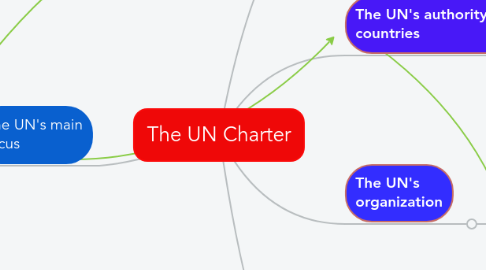
1. The UN's main focus
1.1. the UN is more about global progress
1.1.1. if the UN was all or more about about preserving the power of the Permanent 5 (China, Russia, UK, USA, France), they would not have even allowed any other country in.
1.1.1.1. The permanent 5 are the great powers or victors of World War II. These countries are China, Russia, United States,France, and the United Kingdom
1.1.1.2. This reason for this is because allowing other countries in would be useless and there would be no point and also, the UN is mainly focusing on the Global Goals and previously working on the Millennium Goals.
1.1.2. There is almost no way that focusing more on the power of the Permanent 5 fits with the amount of progress the UN made.
1.1.2.1. We think this mainly because the issues in the world now are happening mostly in the underdeveloped countries (a.k.a. not the Permanent 5).
1.1.2.1.1. So, if the UN’s focal point were to be the Permanent 5, they would not have made that much progress.
2. Admission to the UN
2.1. Admission into the U.N. is given to any peace-loving state that is willing to abide by their laws.
2.1.1. Specifically Article 4 highlights,”The admission of any such state to membership in the United Nations will be affected by a decision of the General Assembly upon the recommendation of the Security Council.”
2.1.1.1. This shows that members are admitted through the decision of the General Assembly with the recommendation of the security counsels.
2.1.2. However, according to Article 6 which states,”A Member of the United Nations which has persistently violated the Principles contained in the present Charter may be expelled from the Organization by the General Assembly upon the recommendation of the Security Council.”
3. The UN's authority over countries
3.1. The UN cannot infringe on a country's sovereignty.
3.1.1. For example, it states in article 2 that, “The Organization is based on the principle of the sovereign equality of all its Members.”
3.1.1.1. This demonstrates that the organization is centered around retaining equality and not infringe on the rights of individual nations.
4. The UN's organization
4.1. Every country has an equal vote regardless of wealth and power.
4.1.1. In Chapter 3 article 8 it says, “The United Nations shall place no restrictions on the eligibility of men and women to participate in any capacity and under conditions of equality in its principal and subsidiary organs.”
4.1.1.1. This shows how they let everyone have a say opposed to normally not giving women the same rights as men for jobs.
4.1.2. In Chapter 19, article 111, it says, “The present Charter, of which the Chinese, French, Russian, English, and Spanish texts are equally authentic, shall remain deposited in the archives of the Government of the United States of America. Duly certified copies thereof shall be transmitted by that Government to the Governments of the other signatory states.”
4.1.2.1. This also shows the equality through people because they use the main languages that people mainly speak.
5. The Security Council's Authority
5.1. The Charter does not specify when a domestic matter has become an international matter, so in our opinion the Security Council should determine that based off of three criteria.
5.1.1. One of these times is if there is a human rights violation against a large group of people.
5.1.1.1. The Security Council also interferes when matters between nations escalate to a very heated level.
5.1.2. The third time is when a state complains about the matter, stating that they believe in the future it could affect them or that the matter is dangerous.
5.1.2.1. If an event harms one of the permanent 5 countries, such as an event that is similar to the holocaust, the Security Council will vote if the country would still be apart of the country or not.

